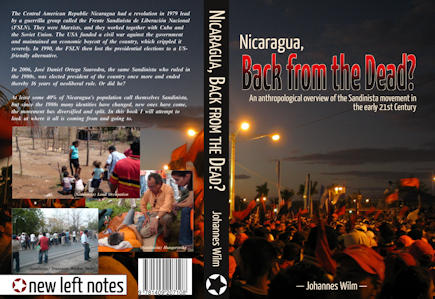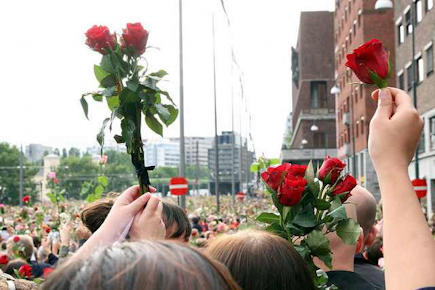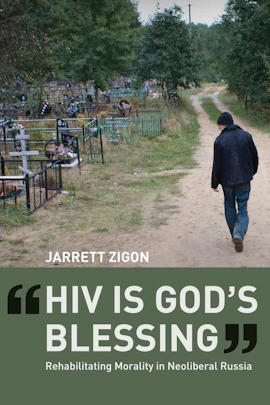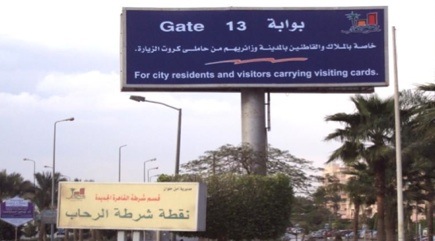The notion that there is democracy in the West, while there is none in the “rest” might be one of the most powerful and dangerous myths of our time. In reality, democracy is a contested concept everywhere in the world, not only in Egypt or Tunesia, but also in Britain.
from Rap responds to the riots: ‘They have to take us seriously’ (Guardian 12.8.11)
Two months ago Maha Abdelrahman said on a conference in Cairo about the global context of the Egyptian revolution:
– What I think is happening is that people from Egypt, Tunesia, Russia, Greece, UK and many other countries are discovering that they are natural allies, engaged in a common purpose.
– We’re not in the middle of a revolution, but we might be in the midth of an important phase where revolutionary development on a global scale is taking place and the limits of the global neoliberal capitalism are being brought to light.
Darcus Howe, a 68-year-old West Indian writer, civil rights activist and resident of South London, told a shocked BBC anchor Fiona Armstrong in front of burnt down houses:
– I don’t call it rioting. I call it an insurrection of the masses of the people. It is happening in Syria, it is happening in Clapham, it’s happening in Liverpool, it’s happening in Port-au-Spain, Trinidad, and that is the nature of the historical moment.
Much is said and written about the riots in England. The discourse itself is highly interesting. The political establishment and its allies in mainstream media quickly dismissed the riots in England as a brainless, unpolitical, and criminal act by a “partly mentally disturbed underclass”. They treated the rioters and activists in an strikingly arrogant, patronizing and classist way. The BBC interview with rights activist Darcus Howe is a good example:
The BBC sounded in their coverage of the riots like Mubarak’s state television during the Egyptian revolution, says Egyptian blogger and activist Mostafa Hussein:
“BBC is making it sound like young people have a single aim and that’s to loot and vandalise. Nothing or very little on why they are doing so.”
These reactions show clearly what’s at stake in Britain, Joe Hoover and Meera Sabaratnam write in their post Reading violence- what’s political about the London riots. The reactions confirm the fact, that Britain is a hierarchical society where the rich oppress the poor:
This is a solid, deep form of alienation built up not overnight, or over the last two years in response to cuts (shame on you Ken Livingstone) but one which is built into the fabric of the broad political settlement of the last decades and reflected in the city’s divisions between rich and poor, between black, brown and white, between young and old.
The riots rest on a conviction not just that the barriers are there, but that they are solid walls, through which none will pass. The reactions to them as ‘mindless violence’ simply confirm this fact. It is not that people are rioting because they don’t have jobs, but because they must believe, ultimately, gloomily, grimly, that there is nothing for them in their future.
While the mass protests in Egypt and the rioting in England cannot be equated ("Egyptians and Tunisians took revenge for Khaled Said and Bouazizi by peacefully toppling their murdering regimes, not stealing DVD players.“not by stealing DVDs”, Mosa’ab Elshamy comments), the contexts in which they occurred are similar: growing inequalities due to neoliberal policies and an inceasingly oppressive state that does not care for its citizens.
SocProf from the Global Sociology blog writes:
So, whatever the initial reason for the uprising in Tottenham, it is clear that many of the countries where austerity policies are being imposed from above on the general population are facing socially explosive situations.(…)
SocProf lists examples from Israel, Chile, Greece, Spain and the “Arab Spring":
What we see is the global civil society rising up against what is clearly exposed as the alliance of the corporate sector (…) and Western governments (…).
In this process, the governments turn repressive against oppositional voices. Several examples (including from the UK) are provided that show how dissent is criminalised
The message is clear: dissent will not be tolerated as the whole anti-terror apparatus is used not against terrorists but against cyber-dissenters and protesters.
Why the riots are political - a good summary
As reaction to the riots, Cameron considers – in similar way as his friend Mubarak (source) earlier this year - to shut down social network sites like Facebook and Twitter and sms services as well for “those suspected of planning criminal acts”.
He talked like a dictator when he replied to criticism from rights groups: He will not let “phony concerns about human rights” get in the way of the “fight back” against the riots, he said. In the macrumors forum, he was called David “Mubarak” Cameron. It is no longer uncommon to equate the UK with (former) Middle East dicatorships. The story San Francisco Cops Jam Cell Phones to Prevent Protest is introduced this way: “It’s not just the London police and Middle East dictators who try to curb unrest by clamping down on communications networks.”
When we link the current riots in England with the so called Arab Spring, we would see other things than “midlessness” at stake, suggests sociologist Joost Van Loon on Space and Culture:
Suddenly, criminals would become legitimate protestors fighting against an oppressive state who have turned democracy into a puppet show.
Anthropologist Sean Carey criticizes the reactions of the politicians as well:
Mindlessness would create randomness, but the events unfolding are far from being random. Instead, I would argue that what we are witnessing is a significant symbolic statement about the way power – the power of life and death exercised by police officers as well as the power to consume – is arranged in British society.
The riots are said to have started with a protest against the controversial killing of Mark Duggan by the English police during an anti-gun crime operation. Yet no commentator links the incredible number of riots in different cities to that particular incident, notes anthropologist Gabriel Marranci.
And when somebody, as Darcus Howe in the mentioned BBC interview is trying to address this issue, he is cut off and silenced. “We cannot talk about this now. We don’t know what has happened. We have to wait for the police inquiry", the BBC news anchor said.
Al Jazeera gives an account of the events:
On Saturday, hundreds of people gathered outside the Tottenham police station, peacefully calling for “justice” for Mark Duggan, a man killed by officers three days prior. Police stood in formation, separating the community members from the station they were guarding, until a 16-year-old woman reportedly approached an officer to find out what was going on.
According to a witness account, some officers pushed the young woman and drew their batons. “And that’s when the people started to retaliate. Now I think in all circumstances, having seen that, most people retaliate,” said the witness.
Witness account
“When the rioters themselves are asked, they will say that they are abused by police, harassed by them, and nobody’s done a thing about it”, says Richard Seymour PhD candidate at the London School of Economics to Al Jazeera. There have been 333 deaths in police custody between 1998 and 2010 in Britain. Large, peaceful protests in response to these killings were more or less ignored, he said. Not a single officer has been prosecuted.
As a result, Duggan’s killing crossed a threshold for young people, angry with the systems that have left them behind, and tired of non-violent protest that goes without much response.
By the way, in an article in the Danish newspaper Information, Rune Lykkeberg reminds us on a book that was reviewed in all major English media only two months ago: Chavs: The Demonization of the Working Class by Owen Jones. This book “exposes class hatred in modern Britain”, the reviewer in the Independent explains. “In the public domain of news and culture, within the arc of some 30 years, a once-proud working class has been residualised into a violent, degenerate, workless mob.”
Class and classism are under-researched topics in mainstream anthropology.
More riot-links:
Mapping the riots with poverty (Map by the Guardian 10.8.11)
From the Arab Spring to Liverpool? (Al Jazeera, 11.8.11)
London rioters resent media image of hooded teen thug (Reuters - Ahram Online 11.8.11)
Some thoughts on the London “riots”: Foucault’s genealogy of neoliberalism and “police as a public service” (Anthropoliteia: the anthropology of policing, 12.8.11)
Martha Nussbaum: Democracy at risk from emphasis on ‘useful machines (The Australian, 12.8.11)
Maia Green: News from the UK (Savage Minds, 10.8.11)
What’s Worse? Looting or Invading? (Robin Beste, Consortium News / Stop The War Coalition 15.8.11)
SEE ALSO:
Anthropologist uncovers how global elites undermine democracy
Thesis: Neoliberal policies, urban segregation and the Egyptian revolution
Ethnographic study: Why the education system fails white working-class children
“A postcolonial urban apartheid": Two anthropologists on the riots in France
Riots in France and silent anthropologists
Criticizes “scholarly and political indifference toward the workers’ lives”
Ethnographic study of anti-corporate globalization movements
– Use Anthropology to Build A Human Economy





Recent comments